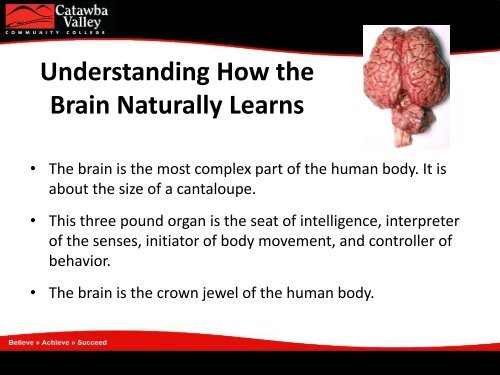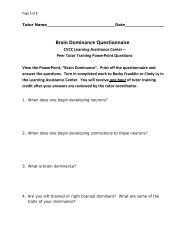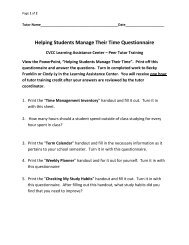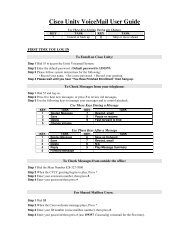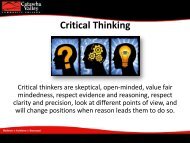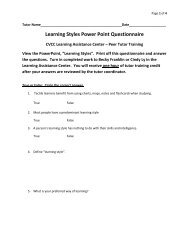Brain Naturally Learns
Understanding How the Brain Naturally Learns
Understanding How the Brain Naturally Learns
You also want an ePaper? Increase the reach of your titles
YUMPU automatically turns print PDFs into web optimized ePapers that Google loves.
Understanding How the<strong>Brain</strong> <strong>Naturally</strong> <strong>Learns</strong>• The brain is the most complex part of the human body. It isabout the size of a cantaloupe.• This three pound organ is the seat of intelligence, interpreterof the senses, initiator of body movement, and controller ofbehavior.• The brain is the crown jewel of the human body.
Understanding How the <strong>Brain</strong><strong>Naturally</strong> <strong>Learns</strong>What happens inside your brain?<strong>Brain</strong>-friendly ways to learn betterHow homework helps your brainHow emotions affect learning andmemory
10% of what we ???20% of what we ???30% of what we ???50% of what we ???70% of what is ???80% of what is ???95% of what we ???
How We Learn10% of what we READ20% of what we HEAR30% of what we SEE50% of what we SEE and HEAR70% of what is DISCUSSED with OTHERS80% of what is EXPERIENCED PERSONALLY95% of what we TEACH TO SOMEONE ELSE
Natural Learning Process• More than 8,000 people – from 2 nd graders tograduate students have reported how theylearned to be good at something outside ofschool.• Every group, without exception, has reported thesame sequence of stages by which they learned.• What have you learned to be good at outside ofschool?
The Natural Learning ProcessThis is how the brain learns.The brain learns by constructing knowledge through sequential stages.Stage 1: Motivation/watch, have to, show interestStage 2: Start to Practice/practice, trial and error, ask questionsStage 3: Advanced Practice/practice lessons, read, confidenceStage 4: Skillfulness/some success, enjoyment, sharingStage 5: Refinement/improvement, natural pleasure, creativeStage 6: Mastery/teach, recognition, higher challenges
How the <strong>Brain</strong> <strong>Learns</strong>• <strong>Brain</strong> cells are called neurons.• You are born with at least 100 billion neurons.• Dendrites (fibers) grow out of the neurons when you listento/write about/talk about/ practice something.Dendrites can grow only from a dendrite (fiber) that is alreadythere – from something the learner already knows.
How the <strong>Brain</strong><strong>Learns</strong>• Like twigs on a tree dendrites can grow onlyfrom a twig or branch that is already there.• Then like twigs growing on a tree, learning isconstructed, higher and higher.• As dendrites get higher and higher, what doyou think happens?
• Neurons (brain cell)know how to growdendrites, just like astomach knows how todigest food.• Learning = Growth ofdendrites.• New dendrites take timeto grow; it takes a lot ofpractice for them togrow.Learning is Natural!
Connections Form BetweenNeurons (<strong>Brain</strong> Cells)• When two dendrites growclose together, a contactpoint is formed.• A small gap at the contactpoint is called the synapse.• Messages are sent fromone neuron to another aselectrical signals travelacross the synapse.
As We Learn…• As we learn, specific dendrites grow so that specificneurons connect at specific synapses to create largeand more complex networks.• There can be as many as 10,000 connections(synapses) per neuron ( 100 billion neurons.• Do the math!! - a very complex network.
As We Learn …• Synapses can change in number minute by minute.• Some synapses are strong, and some are weak – soweak they don’t even send a signal.• Through learning, weak synapses can become strong.• No matter how many synapses a neuron has, it alsohas the potential to grow more.
Growing Dendrites = Learning
Neural Network Growth
“Practice” Builds Stronger Connections• When you practice something, thedendrites grow thicker with a fattycoating.• The thicker the dendrites, thefaster the signals travel. Thecoating also reduces interference.• Have you ever noticed how somepeople seem to come up with theanswer quicker than others?Thicker dendrites.
“Practice” Builds Double Connections• With enough practice,the dendrites build adouble connection.• Faster, stronger,double connectionslast a very long time.You remember whatyou learned!
ImplicationsIf students have not had the opportunity to grow the foundationdendrites for a new topic or skill, they don’t have the basis fromwhich to grow – on which to connect and construct – the dendritesfor the higher levels of skill and knowledge.Should we judge students as incapable or of less intelligence ortalent and throw them and their potential away because they neverhad that opportunity?No one can understand anything if it isn’t connected in some way tosomething they already know.
Short-term Memory Is Very Short!• If you learn something new and do it only once ortwice, the dendrite connection is very fragile and candisappear within hours.– Within 20 minutes, you remember only 60%.– Within 24 hours, you remember only 30%.But if you practice within 24 hours, and thenpractice again later, you remember 80%.
Make the Most ofPractice Time• You grow dendrites for exactly the same thing youare practicing.• If you listen or watch while math problems aresolved, you grow dendrites for listening or forwatching.• If you actually solve the problems yourself, yougrow dendrites for solving.
Emotions Affect Learning• When learners feel unconfident or anxious, certain chemicalsflow into the synapses to shut them down.Danger! No time to think! Just run away!This is the flight reaction = “run for your life!”Students mistakenly think they have a poor memory, but it istheir emotions that are sabotaging them.• When learners feel confident, different chemicals flow intothe synapses that make them work quickly and well:“I can handle this.” This is the fight reaction.
Emotions Affect Learning• Feelings and emotions always affect reasoningand memory, either in a positive way or anegative way.• Feelings can help us remember and can alsomake us forget.
What Can Emotions Do to You?• Anxiety floods your body withadrenaline (“fight or flight”).• Adrenaline makes it hard for theneuro-transmitters to carrymessages across the synapses inyour brain.• That causes “blanking out” on atest. And that is called test anxiety.
How Can Emotions Help You?• Endorphins make you feelcalm.• Your body producesendorphins when yourelax, exercise, laugh, orlearn new things.• If you practice producingcalming hormones, it willhelp when you are understress.
<strong>Brain</strong>ology• Throughout our lives our brains change constantly with learning andexperience.• Does this have implications for students’ motivation and learning? YES!• What students believe about their brains – whether they see their intelligenceas something that is fixed or something that can grow and change – hasprofound effects on their motivation, learning, and school achievement.(Dweck, 2006).• These mindsets create different psychological worlds:• One in which students are afraid of challenges and devastated by setbacks• One where students relish challenges and are resilient in the face of setbacks
Fixed Mindset• Many students believe that intelligence is fixed, that each personhas a certain amount and that is that.• These students worry about how much of this fixed intelligencethey possess.• A fixed mindset makes challenges threatening for students becausethe student believes that his fixed ability may not be up to the task.• Mistakes and failures become demoralizing because the studentbelieves that such setbacks reflect badly on his level of fixedintelligence.
Growth Mindset• Other students believe that intelligence is something that can be cultivatedthrough effort and education. They don't necessarily believe that everyonehas the same abilities or that anyone can be as smart as Einstein.• They understand that even Einstein wasn’t Einstein until he put in years offocused hard work.• Students with this growth mindset believe that intelligence is a potentialthat can be realized through learning.• Getting smarter comes from confronting challenges, profiting from mistakesand persevering in the face of setbacks.
Students with Fixed Mindset• Believe that intelligence is just “fixed.”• Cares more about how smart they appear that how smart they really are.• Believes that if you worked hard in school it meant you didn’t have ability.• If you are smart, things will just come naturally to you.• Since just about every worthwhile pursuit involves effort over a longperiod of time, this belief is potentially crippling, not only in school, butalso in life.• After a setback in school they were more likely to feel dumb, study less thenext time, and seriously consider cheating.• If you feel dumb – permanently dumb – in an academic area, there is nogood way to bounce back and be successful in the future.• This is why so many bright students stop working when school becomeshard.
Students with Growth Mindsets• Believe that intelligence is a potential that can be realized throughlearning.• Confronting challenges, profiting from mistakes, and persevering in theface of setbacks become ways of getting “smarter.”• Much more interested in learning than in just looking smart in school.• Believe that the harder you work the more your ability will grow, and thateven geniuses have had to work hard for their accomplishments.• After a setback in school, these students simply study more or studydifferently the next time.• It is the belief that intelligence can be developed that opens students to alove of learning, a belief in the power of effort and constructive,determined reactions to setbacks.
How do students learn these mindsets?The Praise Movement• In the 1990s parents and schools decided that the most important thing for kids tohave was self-esteem.• Almost 85% of the parents in the 1990s endorsed the notion that it was necessaryto praise their children’s abilities to give them confidence and them achieve.• Students praised for their intelligence did not want to learn.• For students that are praised for their intelligence, it is too humiliating for them toadmit mistakes• When offered a challenging task, the majority opted for an easier one, one onwhich they could avoid making mistakes.• Intelligence praise makes students fragile.• Students praised for intelligence will lose their confidence as soon as the problemsget more difficult.
How do students learn these mindsets?The Effort Praise• Students praised for their efforts in school will maintain theirconfidence, their motivation and their performance.• Students praised for their efforts in school want a task theycan learn from• Believe that intelligence can be developed• Believe they are in control of their brain and its development.
Students as Empowered, Engaged,Successful LearnersWhen students self-evaluate how much theirdendrites have grown, they see that they are incontrol of their learning.They know their learning increases as they put inmore time and effort.
About Learning and TeachingLearning is all about empowerment.The brain is our survival organ. It is born tolearn, is impelled to learn.The brain starts all learning from where it is andconstructs the new from there.
REVIEWYou are naturallysmart, because …• Your brain knows how to grow dendrites justlike your stomach knows how to digest food.• Think about a baby who learns to speak in itsnative language without any special classes ortraining!
• You must dosomething active(explain, solve,draw, write, etc.)in order to learn,because…REVIEW
REVIEWYou must do something active to learn,because…• Dendrites grow ONLY when you are activelydoing something.• No one else can grow dendrites for you!
REVIEWDendrites cannot grow in a void• New dendrites can only grow off of what is already there.New skills must connect to, and grow off of, previouslylearned skills.• If you do not have the necessary dendrites in place, newmaterial will seem to go “right over your head”.• So, start with a course that matches your skill level.• If you don’t have the necessary foundation, you will struggle.
REVIEWDendrites take time togrow, because…• It takes a lot of practice for dendrites to grow.• This is why you do homework.• This is why trying to cram everything into yourbrain the night before a test doesn’t work.
Review• Making mistakes, and getting feedback so youcan correct them, allows you to check theaccuracy of the connections in your brain.• Be sure to get feedback quickly so you don’tpractice the wrong thing and build a strongbut wrong connection!
Use dendrite theory to answer thesequestions…1. I understand what’s going on in the lecture justfine. But when I get home and start on thehomework assignment, why am I lost?2. I attend class and do all the homework and feellike I understand everything. Then why do I just“blank out” on the test and can’t do anything?
Can you answer these?3. Why should I do all this homework? It’s justthe same thing over and over.4. I work full time. Can I do homework only onweekends and still pass the course?
More questions…5. I’ve been absent for a week but there’s a testtomorrow. Can I cram it all in tonight?6. Why can’t I take this math course even if Ihaven’t passed the prerequisite course (orgotten a high enough score on the placementtest)?
So what should you do?• Start with the right math course; then skills buildfrom one course to the next. Take the rest of yourmath courses one at a time, in order.• Do some of the homework as soon as possible afterclass, before you forget.• Try to practice math every day.• To manage anxiety, learn simple relaxationtechniques such as slow, deep breathing.
More things you can do…• Make sure you are actively DOING somethingwhen you study.– Make study cards.– Draw pictures or diagrams.– Solve lots of problems; check your answers.– Check your understanding by explaining how to do aproblem to another student.– Create a practice test for yourself. Work it in the sameamount of time you’ll be given in class.
Enjoy Using Your <strong>Brain</strong>!


